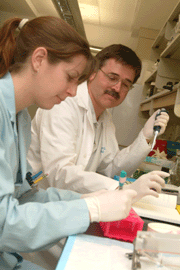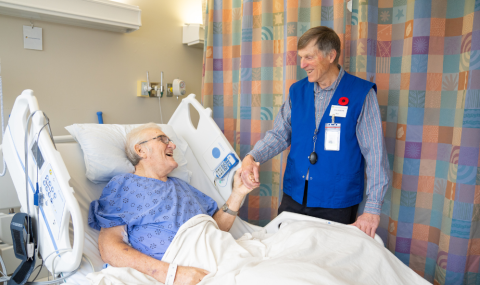Director: Strategic Training Program in Cancer Research and Technology Transfer (CaRTT), London Health Sciences Centre, London, Ontario
Distinguished Oncology Scientist: Verspeeten Family Cancer Centre and LHSC
Assistant Director: London Health Sciences Centre Research Institute
Professor: Department of Oncology, University of Western Ontario, London, Ontario
Cross Appointments: Department of Pathology, Department of Microbiology & Immunology, Department of Physiology and Pharmacology
Mailing Address
Verspeeten Family Cancer Centre
Room A4-130A, Cancer Research Laboratory Program
790 Commissioners Rd. E.
London, Ontario
Canada N6A 4L6
Tel: 519.685.8654
Fax: 519.685.8673
Email: Jim Koropatnick
Laboratory
Tumour cells may become resistant to killing by drugs or radiation, and this is a significant cause of failure of cancer therapy. The response of both normal and cancer cells to toxins (including chemotherapeutic agents) and stress includes increased expression of genes that enhance treatment resistance. Our aim is to identify "resistance" genes that are stimulated by exposure to heavy metals and to examine their normal cellular functions, and the way they increase resistance. Our ultimate goal is to enhance treatment in tumour cells by manipulating the activity of these genes and their products using metal, drug, and/or gene-based therapies.
Staff and Trainees
Our aim is to identify "resistance" genes that are stimulated by exposure to heavy metals and to examine their normal cellular functions, and the way they increase resistance. Our ultimate goal is to enhance treatment in tumour cells by manipulating the activity of these genes and their products using metal, drug, and/or gene-based therapies.
Research Associates
Peter Ferguson, Cancer Research Laboratories Program; Adjunct Professor, Department of Physiology & Pharmacology
Project: Anti-cancer drug resistance using various model systems
Email: Peter Ferguson
Saman Maleki-Vareki
Email: Saman Maleki-Vareki
Graduate Students
Faizah Alotaibi
Email: Faizah Alotaibi
Research Technician
Rene Figueredo, Technician
Project: Various
Email: Rene Figueredo
Postdoctoral Fellow
Michael Thwaites
Email: Michael Thwaites
Current Projects
Role of metallothionein in cellular drug resistance and metal-dependent protein function
Metallothioneins (MTs) are a family of proteins whose function has been debated since their discovery: it has been suggested that they modulate cellular resistance to chemotherapy. MT could modulate resistance by: (1) direct "scavenging" of toxic molecules, and (2) mediating processes critical in survival, growth, cell cycle, resistance to mutation, and metal homeostasis. We are exploring these roles by measuring drug resistance with respect to the activity of metal-dependent enzymes and transcription factors, mutation rate, cell cycle changes, cellular localization of MT proteins, adhesion, and the invasion potential of cultured human and rodent tumour cells with genetically-altered MT expression. This is achieved by transfection to either upregulate or inhibit MT expression.
Our studies have shown that metal salts transiently enhance cellular resistance to chemotherapy, and this may represent a useful way to reduce toxicity of chemotherapy in normal human tissues. We have also demonstrated that when metallothionein expression is specifically deregulated in cancer cells, treatment resistance is changed. This may be important in enhancing tumour cell sensitivity to chemotherapy. In addition, physiologically important roles for metallothionein in immune cell function (including the respiratory burst, invasion, and adhesion) have been identified. Inducers and repressors of MT expression may therefore be important in therapies to alter the activity of those cells.
Our studies so far lead us to conclude that metallothionein plays a fundamental role in metal homeostasis to maintain cell function and/or other cellular events that indirectly affect cellular drug resistance.
Metals and metallothioneins in kidney cell growth
Increased MT gene transcription and protein accumulation occurs during compensatory renal growth in rats, and we are studying this as a model for the situation faced by kidney donors and patients with kidney malfunction. This involves investigating the role of increased MT in cellular homeostasis, and its effect on resistance to blood-borne toxins (including metals) in collaboration with Dr. R. Zalups (Mercer University, GA). The role of enhanced metallothionein during growth on kidney cell function is being assessed.




